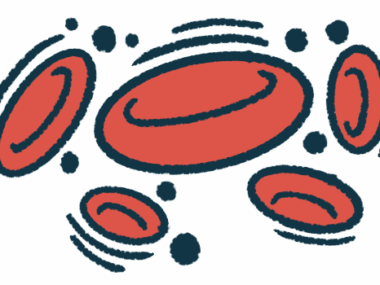Long-term Treatment With Enjaymo Safe and Effective, Trial Data Show
Written by |

Long-term treatment with Sanofi’s Enjaymo (sutimlimab-jome) safely and effectively prevented red blood cell destruction (hemolysis), anemia, and the need for blood transfusions, while improving the quality of life in adults with primary cold agglutinin disease (CAD).
That’s according to 2.5 years of data from the Phase 3 CARDINAL trial (NCT03347396), whose six-month findings supported the therapy’s approval in the U.S., along with similar applications being reviewed by health authorities in Europe and Japan.
Sanofi expects an opinion from the European Medicines Agency’s Committee for Medicinal Products for Human Use by year’s end. The committee’s recommendations are generally accepted by the European Commission, which makes the final decision on approving all medicines in the European Union.
These and other findings from CARDINAL and the Phase 3 CADENZA trial (NCT03347422) were shared by Sanofi through two oral presentations and two posters at the 2022 Annual European Hematology Association Congress, held June 9–17 online and in Vienna.
“Following the [U.S. Food and Drug Administration’s] recent approval of Enjaymo (sutimlimab) as the first-and-only approved treatment indicated to decrease the need for red blood cell transfusion due to hemolysis in adults with CAD, we are excited to share our latest research in the area,” Karin Knobe, MD, PhD, Sanofi’s global head of development in rare diseases and rare blood disorders, said in a press release
Enjaymo and the classical complement pathway
Developed by Sanofi’s subsidiary Bioverativ, Enjaymo works by selectively suppressing the activity of C1, a key protein in the classical complement pathway that is overly active in CAD, leading to hemolysis and anemia.
The complement system is a set of more than 30 blood proteins that contribute to the body’s natural immune defenses. By blocking only one of its pathways, the therapy ensures the complement system is not completely inactive.
Enjaymo is expected to safely prevent chronic hemolysis, increase hemoglobin levels, and reduce or prevent the need for blood transfusions, ultimately reducing patients’ disease burden and improving their quality of life. Hemoglobin is the protein responsible for transporting oxygen in red blood cells.
The therapy is administered directly into the bloodstream at weight-based doses every week for two weeks and every other week thereafter.
Long-term treatment with Enjaymo
The international, two-part CARDINAL trial evaluated about 2.5 years of Enjaymo treatment in 24 adults with primary CAD who had received at least one blood transfusion within six months of enrolling in the trial.
A total of 22 participants completed the first 26 weeks (about six months) of treatment that comprised the study’s Part A and chose to enter its two-year extension Part B, which was completed by 19 of them (86.4%).
As previously reported, 54% of patients met the trial’s main goal, with hemoglobin levels rising by at least 2 grams per deciliter (g/dL) or remaining at a minimum of 12 g/dL after six months of treatment, while needing no additional blood transfusions.
Also, hemolysis markers were normalized and fatigue showed significant and clinically meaningful reductions — suggestive of improved quality of life — from the first week of treatment. Fatigue was assessed with the patient-reported Functional Assessment of Chronic Illness Therapy (FACIT)-Fatigue Score. The therapy was also generally safe and well tolerated.
CARDINAL’s 2.5 years of safety and efficacy data were shared in two oral presentations.
One was titled, “Inhibition of Complement C1s With Sutimlimab in Patients With Cold Agglutinin Disease (CAD): 2-Year Follow-Up From The CARDINAL Study,” and the other was named, “Sutimlimab, A Complement C1s Inhibitor, Provides Sustained Improvements in Patient-Reported Outcomes in Patients With Cold Agglutinin Disease (CAD): 2 Year Follow-Up From The CARDINAL Study.”
Consistent with those at six months, 2.5-year results showed Enjaymo maintained hemoglobin at levels higher than 11 g/dL and led to a sustained normalization of hemolysis markers throughout the study. During the trial’s Part B, 15 (68.2%) patients remained free of blood transfusions.
Lower fatigue levels were also maintained throughout 2.5 years and a greater proportion of patients reported no fatigue or mild fatigue relative to the study’s start, or baseline (80% vs. 30%). There were also meaningful and sustained improvements in health-related quality of life, as assessed with other patient-reported outcomes.
No new safety concerns were identified in Part B’s two-year treatment period.
“This study has demonstrated that [Enjaymo] is an effective and well-tolerated long-term therapy for the management of chronic CAD through continued [suppression] of the classical [complement pathway],” the researchers wrote.
Patients’ data at CARDINAL’s final follow-up visit, completed at nine weeks after Enjaymo’s last dose, were presented in the poster, “Inhibition of Complement C1s With Sutimlimab in Patients with Cold Agglutinin Disease (CAD): Results Following 9-Week Washout Period In Phase 3 CARDINAL Study (NCT03347396).”
A total of 20 patients completed the final follow-up visit. The other two died during the nine-week follow-up period, one due to CAD exacerbation and the other due to pneumonia associated with a very hard-to-treat bacteria.
Results showed that after nine weeks without Enjaymo — corresponding to about five missed infusions — there was a general reversal of the benefits seen at 2.5 years of treatment.
Specifically, the near-complete suppression of the classical complement pathway was reversed and the levels of hemoglobin and hemolysis markers, as well as fatigue scores, approached pre-treatment values.
Most of the 45 side effects occurring in 11 patients during the nine-week period were due to CAD worsening.
In the poster, “Sutimlimab After Prior Rituximab Use in Patients with Cold Agglutinin Disease (CAD): Pooled Post-hoc Analyses from the CARDINAL and CADENZA Trials,” researchers showed Enjaymo’s benefits were observed regardless of the previous use of rituximab.
With or without Rituximab
Rituximab, sold as Rituxan in the U.S. and as MabThera in Europe, is a B-cell depleting therapy commonly used off-label in people with CAD. B-cells are types of immune cells that produce antibodies, those involved in fighting infections and those involved in the abnormal immune responses that trigger CAD.
Researchers analyzed pooled six-month data from 46 CAD patients given Enjaymo in CARDINAL and in the Phase 3 CADENZA trial. CADENZA had a similar design to CARDINAL, but tested the therapy against a placebo in 24 adults with CAD who lacked a recent history of a blood transfusion.
At study’s start, 25 (54%) of these patients had been previously treated with rituximab, with a mean interval between its last dose and starting Enjaymo of 26.4 months.
Baseline clinical and laboratory data were similar between subgroups, but those with prior rituximab use had a longer disease duration and lower levels of CAD-associated antibodies, received more blood transfusions, and had more CAD-related hospitalizations.
Changes in hemoglobin levels, hemolysis markers, and FACIT-Fatigue score were comparable between the subgroups, as well as the proportion of responders, or those meeting the trials’ main goal (60% in the rituximab group vs. 67% in the non-rituximab group).
“In this post-hoc analysis, response rates were similar between subgroups of patients with prior off-label rituximab treatment versus rituximab-naïve patients. These results suggest that [Enjaymo] is effective in patients with CAD, irrespective of prior off-label rituximab use,” the researchers wrote.







